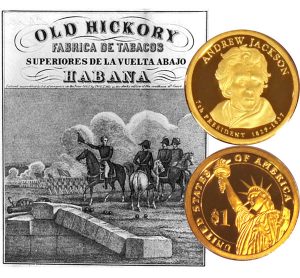Today, the Andrew Jackson Presidential One Dollar Coin remembers an article posted in a November 13, 1865 newspaper that tells the story of “Old Hickory.”
Found in the Boston Evening Transcript of 152 years ago:
=====
Origin of “Old Hickory.”
Mr. Editor:
In your issue of yesterday you gave a paragraph from a Mississippi paper, professing to furnish an explanation of the manner in which the soubriquet of Old Hickory came to be applied to General Jackson.
I offer another explanation of the same matter, the claim of which to authenticity will appear in the course of the statement.
Being in Nashville in the winter of 1840, I met with the General, and accepted an invitation to pass a few days at the Hermitage during the Christmas holidays.
The General’s remarkable tact in causing his guests to feel themselves quite at ease has been often mentioned, and the writer was emboldened by it to ask many questions relative to incidents in the personal history of his distinguished host, and among others, how he obtained the designation already referred to.
His explanation was this:
After the close of the Creek campaign, when he was marching his command home, being deficient in transportation for the sick, he suggested to his staff and other officers the propriety of allowing some of the feeblest of the men to alternate with the officers in riding their horses, and set the example by himself dismounting and putting an exhausted soldier on his own horse.
His officers readily complied with the humane suggestion, and the staff, with the General, trudged merrily along on foot.
His chief surgeon, Dr. Hogg, who at the time of this narration was an eminent physician in Nashville, a hale old man, and an intense personal and political friend of the General, suggested privately to the other members of the staff that they should tire the General down by rapid walking.
The idea was heartily adopted as a first rate prospective joke, and attempted to carry it out.
The staff strode off manfully, but the General, ignorant, of course, of the conspiracy, kept his place in the van.
Mile after mile was measured off in this way, till one after another of the staff, failing to see that the General was likely to break down, began to drop several rods to the rear.
Finally the doctor himself called a halt, and wiping his dripping brow, exclaimed, “boys, we may as well give it up; the General is as tough as old hickory.”
The plot was then explained, and the laugh came in there, but on a different side from what the officers expected.
The General added that the term suggested by the doctor’s comparison was from that time adopted by the older members of his military family, and gradually obtained a currency wide as the world.
While on the subject I would like to add an anecdote, which the General supplemented to the foregoing narration.
In the course of the same march it became necessary to halt a few days to rest the men.
One evening the General lit his cob pipe—one of the same kind which he was smoking during his narrative of the incident—and walked around among the tents to see the condition of the men.
A sound of angry altercation in one induced him enter and inquire the cause of the disturbance.
A huge man replied that his messmates called him platter-foot, and he was not going to stand it any longer; at the same time extending a foot, the enormous platitude of which compelled a burst of laughter from the General.
Recovering from that, he told the soldier that it was unmanly to get angry at harmless jokes of the camp, and added, “for instance, now your colonel calls me ‘Old Hickory,’ and if you like that better, I’ll swap names with you on the spot.”
The swap, however, seems not to have been effected, there being, doubtless, equal appropriateness in the original bestowment of each.
[Indianapolis Daily Journal.]
=====
The Andrew Jackson Presidential One Dollar Coin shows with an image of an Old Hickory tobacco label, circa 1860.
